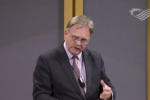
North Wales Assembly Member Mark Isherwood has criticised the Welsh Government for giving Wales the lowest percentage share of the NHS budget of any part of the UK last year and called on those in power to address the funding gap.
During yesterday’s Questions to the First Minister, Mr Isherwood blamed the many practice closures in North Wales on the lack of funding and referred to the good work taking place at the ‘Quay to Well-being’ in Connah’s Quay and the Community Care Collaborative CIC Hub in Wrexham.
He said:
“Despite years of warnings by the North Wales Local Medical Committee, General Practice in Wales received the lowest percentage share of the NHS budget of any part of the UK last year. That's the key reason why so many practices in North Wales have closed.
“How will you address that share of funding gap, as opposed to funding gap, and divert provision to deliver services, bringing people who require care and support and the people who provide support closer together, to provide social, emotional and medical care for people at the point of need, such as the ‘Quay to Well-being Co-operative led by Dr Anthony Downes in Connah's Quay, and the Community Care Collaborative Community Interest Company Hub in Wrexham led by Dr Karen Sankey?”
In her reply, Leader of the House, Julie James AM , who was standing in for the First Minister, said:
“The Member's right: there are good things happening. For example, over £14 million has been provided to develop integrated health and social care centres at Flint, Blaenau Ffestiniog and Tywyn Memorial Hospital —providing a range of integrated, co-located health, social care and third sector facilities.”
Mr Isherwood added:
“Working with the Wales Co-operative Centre, the ‘Quay to Well-being Co-operative’ is about enabling people and professionals to share power and work in equal partnership, by developing health, social and psychological support through co-production. The Community Care Collaborative CIC Hub, operating out of the Salvation Army Centre in Wrexham, has brought multiple agencies together, including Health, Social Services, DWP, Housing, Shelter, The Wallich, Substance misuse services, SOVA, Police and others, taking a whole-person approach to addressing people’s physical health, mental health and social needs together. This is much more than the model described by Julie James, introduced by the Labour Welsh Government to fill the gaps left by the Community Hospitals with beds they have closed and the GP practices that have shut.”
ENDS
